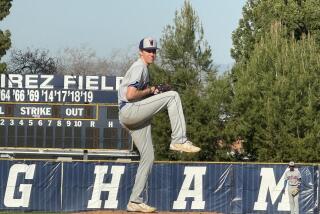Woodbridge Hopes to Keep This Coach Around Awhile : Sea View League: Sam Favata says he’ll reverse the trend and lead the Warriors for some time. He’s also hoping to reverse the team’s fortunes along the way.
- Share via
IRVINE — What is it about the Woodbridge High baseball program that keeps chasing away coaches?
It can’t be the facilities. The baseball field at Windrow Park, roughly a mile from the campus, is two years old, looks better than some minor league parks and is a quantum leap from the Warriors’ old home, Atherton Park.
It can’t be the community, which has the commitment and the funds to turn the baseball program into a winner. Yet only once since Woodbridge opened in 1980 has the team won a Sea View League title, sharing the championship with Irvine in 1993. Last season, the Warriors finished fourth.
But since the five-year reign of Dave Cowen, the school’s first baseball coach and current athletic director, no one has stayed at Woodbridge more than one year, and that was Vince Brown, the Warriors’ most recent coach who departed after two seasons. Before Brown, the revolving door moved at top speed, with five coaches--Kirk Harris, John Ceballos (twice), Tim O’Donoghue and Steve Kemp--in six years.
Sam Favata would like to change that.
And Woodbridge hopes he can.
Favata certainly has the credentials: He had an outstanding high school career at West Covina Edgewood High, helping the team win Southern Section Division 3-A titles in 1976 and 1977, and was an All-American second baseman on Cal State Fullerton’s 1979 national championship team.
A potential major league career was cut short by a serious beaning in the minor leagues in 1981--an injury from which he would need a full year to recover.
Favata, 35, is here because he wanted to return to coaching--he worked at Edgewood from 1985 to 1988 and had a 76-29 record and three league titles before the school closed--and was looking for a program he could mold.
“When I decided to try and coach again, I wanted to find the right high school program,” said Favata, who with his wife Sandra, who coaches softball at Tustin, built a successful real estate loan brokerage business. “I had been offered college jobs, but I wanted a job where you could develop kids. I wanted the 16-, 17- and 18-year-old guys.
“I looked for a program that was a challenge, and this is a 150% challenge.”
Perhaps more for Cowen than Favata. One of the reasons Woodbridge lost Brown was because neither the school nor the district had the teaching slot Brown sought.
And with more schools turning to walk-on coaches to run their programs, those slots grow even more scarce.
“We have everything in place to have a great program--facilities, community support--and now we have another coach who will be top notch,” Cowen said. “Vince had turned our program around and we want to keep moving forward.
“We went through an extensive screening process and Sam came out on top. One of our aims was to try and find someone who would stay. With walk-on coaches you have inherent problems, but Sam has financial stability, his schedule is flexible, and he is here quite a bit. If you’re going to have a walk-on, this is the best (situation) you’re going to get.”
Favata, who was hired in September, says he is in it for the long haul. He has gotten the boosters to help build an office for him and for assistant coaches Jeff Jones, Ruben Sanchez and Scott Parlow. A portable batting cage was purchased. He dreams of team lockers behind the center-field fence “like the old Brooklyn Dodgers.”
He knows generosity comes with a price, but Favata said he is ready to pay the necessary dues.
“I think the people here are trying to get some stability, and not someone who’s just going to be here one or two years,” he said. “Nothing against anyone who has done that--sometimes circumstances get you going in another direction--but they want a winner. Coach Brown did a great job, but now they want a period of winners.”
Yet, Favata insists he does not feel any pressure for instant results.
“It takes three years to build a program. Anybody thinking, ‘You’ve got to win this year or else’ is wrong. But I don’t have anything to lose. And with the support system here . . . if you can’t win with something like this, then something’s wrong.
“I like the position I’m in. I have everything to gain and nothing to lose. It’s not like I’m taking over a program that’s won three of the last four (section) titles. But I know what I can do, and I know I have a different work ethic than I think they are used to in certain ways.”
Certainly no challenge could be tougher than the one Favata faced after July 5, 1981.
Playing for Milwaukee affiliate Stockton in a California League game against Modesto under twilight conditions, Favata didn’t quite see an 0-and-2 fastball from Ed Ritzer. “He wasn’t throwing at me, just trying to move me off the plate,” Favata said. “But I lost it in the lights.”
Instead of ducking, Favata flinched; the ball struck him in the helmet with sickening force, so hard that the ball bounced nearly halfway back to Ritzer.
“I went down and lost my (power of) speech at that second,” Favata said. “I was trying to tell the guys ‘I’m OK’ and it came out ‘huhhh ommmzie waa.’ I was listening to myself and I sounded punch drunk.”
He was taken to the hospital, and a CAT scan revealed a blood clot on the brain. Doctors waited overnight to see if it would dissolve, but the next morning there were two more clots. Favata underwent a two-hour operation, and spent the next year learning to walk and talk again.
Today, Favata still experiences some numbness on the right side of his body, has headaches and occasionally “my speech goes haywire.” But physically he can do just about everything he did before the accident. He may not play baseball anymore, but his golf game is just fine--”I was a five handicap at one time, and I can still shoot in the 80s,” he said.
Contemplating what his life might have been like had he made it to the majors is something Favata no longer does.
“I’ve never been negative about it,” said Favata, who scouted for the Brewers after his playing career ended. “I know in my heart there’s no doubt I would have been in the majors with luck. But there is no bitterness. God wanted that to happen for a reason.”
The accident will not deter Favata from having his pitchers throw on the inside half of the plate. And he has two with good arms--left-hander Josh Torlock, who led the league in strikeouts in the first half of the league season, but was ineligible for the second half; and Marty Pachino, a transfer from Illinois. Both have been clocked at about 90 m.p.h.
Favata said he will have 24 players on his roster this year, in part to build a foundation for the future. He doesn’t expect to have much muscle, but the Warriors have some speed, and Favata said they will run at every opportunity.
He wants Woodbridge baseball to be fast, aggressive and entertaining.
“I’m a big fan of the running game--and making things happen,” Favata said. “Get the edge on every team you play. Never say die--ever.
“At Fullerton we had a bunch of guys who were not No. 1 picks. But (Coach) Augie Garrido had us work hard and believe we could do anything we wanted as long as we worked hard. Really believe we could be the best. That’s one reason why we won the national championship.
“That’s why I talk with these (Woodbridge) guys more than I have to others. I have to coach 10 times harder than I’ve ever, ever had to. I want them to know it’s an honor to be here, that we have something to prove to the community. No Woodbridge team has ever gotten past the second round; all we have to do is win two playoff games and we’re the best team in the history of the school.
“But that’s a short-term goal, and you have to have long-term goals as well. That’s why our motto here is ‘One step at a time, but always forward.’ I think we have good talent. They just have to be hungry, be intense, and believe they can win.”
More to Read
Get our high school sports newsletter
Prep Rally is devoted to the SoCal high school sports experience, bringing you scores, stories and a behind-the-scenes look at what makes prep sports so popular.
You may occasionally receive promotional content from the Los Angeles Times.






